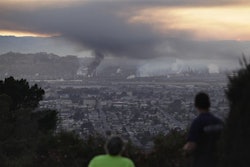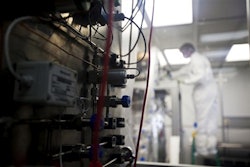LIMERICK, Pa. (AP) -- Machine guns may be coming to a nuclear plant near you.
The Nuclear Regulatory Commission has proposed a rule that would allow security guards to wield machine guns and "enhanced weapons" to guard spent fuel rods being stored at nuclear power plants.
The cost of the weapons upgrade, training and background checks envisioned in the NRC rule could cost the industry between $26.5 million and $34.7 million, according to NRC estimates.
The new rule, if made final, could be used by Exelon Nuclear's Limerick Generating Station to upgrade weaponry if needed, according to NRC spokesman Neil Sheehan.
Any upgrades, and subsequent costs, would be voluntary but in making industry costs estimates "NRC staff assumed that all licensees and certificate holds who fall within the proposed designated classes of facilities would take advantage of making us of enhanced weapons protection," according to the announced of the proposed rule in the Jan. 10 edition of the Federal Register.
"We can't provide specific details on the types of weapons our security officers carry or the extent of Exelon's background investigations (for safeguard reasons)," Dana Melia, communications manager for the nuclear plant, wrote in an e-mail response to a Mercury inquiry.
"But Limerick already receives the highest level of security and protection as mandated by the Nuclear Regulation Commission," Melia wrote.
She wrote that "the proposed rule would require all US nuclear power plants to subject security personnel to additional background checks. It would also allow nuclear operators to apply for enhanced weaponry if deemed necessary."
The NRC has been contemplating the enhanced weaponry upgrade in the wake of a law signed by President George W. Bush in 2005, and in 2009 outlined which facilities "could voluntarily apply" for authority to use "an expanded arsenal of weapons, including machine guns and semi-automatic, large-capacity assault weapons."
But in 2011, "the Commission directed the staff to consider expanding the scope of the current enhanced weapons rule to include at-reactor "spent fuel storage facilities."
The proposed rule change complies with that direction and would now apply to spent fuel storage facilities as well.
"Spent fuel" is the waste by-product of nuclear fission reactors and is primarily uranium that no longer produces enough heat to produce the steam to run generators, but which remains radioactive for thousands of years.
For decades, the federal government was planning a national spent-fuel storage facility beneath Yucca Mountain, Nev., but President Barrack Obama put that effort on hold during his first term. In the meantime, nuclear plants all over the country have had to hold on to every fuel rod used in their plant since they were commissioned.
At first, they were kept in concrete pools inside the reactor building while the rods continued to cool. But eventually, those pools filled to capacity and plants began building outdoor storage sites, equipped with steel casks inside concrete housings to hold the cooling, radioactive fuel.
Called "dry cask storage," Limerick's facility opened in 2007.
"Limerick has 1,143 metric tons of uranium spent fuel on site. At Limerick, the waste is stored above the ground in pools and in casks. It is 20 feet above the groundwater, and it is on the Schuylkill River, which is 40 miles from Philadelphia, Pennsylvania. That is where we currently store high-level nuclear waste."
That was how Illinois Republican Representative John Shimku described Limerick's spent fuel in a July 19, 2012 speech on the floor of the U.S. House of Representatives, during which he took Democratic Senate Majority Leader Harry Reid to task for blocking the establishment of a national nuclear waste depository under Yucca Mountain in Nevada, the state Reid represents in the Senate.
According to the Congressional Research Service (using data from the industry-aligned Nuclear Energy Institute), there were 62,683 metric tons of commercial spent fuel accumulated in the United States as of the end of 2009, the NRC reported.
Of that total, 48,818 metric tons — or about 78 percent — were in pools. 13,856 metric tons — or about 22 percent — were stored in dry casks.The total increases by 2,000 to 2,400 tons annually.
Spent fuel has also been the cause of a two-year delay in Exelon's effort to renew the licenses for its two nuclear reactors.
In September, the NRC decided against appealing a federal court ruling which said the NRC had to take into account the environmental impact of continued storage of spent fuel when considering re-licensing applications.
Currently, the operating licenses on the Limerick plant's two nuclear reactors expire Oct. 26, 2024, for Unit 1, and June 22, 2029, for Unit 2.
Exelon has submitted a request for a 20-year extension on both licenses and a final decision had been expected as early as next April.
Spent fuel stored in dry casks is significantly safer than the rods kept in pools for a variety of reasons, according to a June 27, 2012 report by the Union of Concerned Scientists.
"While dry casks are still vulnerable to safety and security hazards, those risks are reduced," the report concluded.
"In contrast to the large amount of fuel in a single spent fuel pool, each dry cask only holds 10 to 15 tons of spent fuel, or only a few percent of a typical spent fuel pool. Thus, it would require safety failures at many dry casks to produce the scale of radiological release that could result from a safety failure at one spent fuel pool," the Union of Concerned Scientists wrote.
"Likewise, terrorists would have to break open many dry casks to release as much radioactivity as a single spent fuel pool could release. Therefore, an attack on a dry cask storage area would, in most circumstances, result in a much smaller release of radioactivity than an attack on a storage pool," according to the Union of Concerned Scientists.
Arming those guarding these dry cask facilities with more powerful weapons reduces public health risks because better-armed guards have an "increased likelihood of a successful repulsions of an attack," the NRC wrote in the Jan. 10 Federal Register.
Thus the proposal would make it easier to fend off "radiological sabotage" at 65 nuclear power plant sites, 53 of which have on-site fuel storage areas, according to the NRC filing.
"Exelon generation uses state-of-the-art technology and weaponry as part of its comprehensive strategy to keep our facilities and spent fuel storage facilities safe," Melia wrote of the Limerick plant. "Limerick's security officers are full-time Exelon employees, all highly trained paramilitary personnel qualified in force protection and anti-terrorism techniques."






















